Imagine waking up in the morning and being greeted by an unpleasant odor every time you use the bathroom. Could this be a result of uncontrolled diabetes? The answer may surprise you. In this insightful article, we will explore the link between uncontrolled diabetes and the unfortunate occurrence of bad-smelling urine in the morning. Strap in, grab your coffee, and let’s unravel this mysterious scent together.
Understanding Diabetes
What is diabetes?
Diabetes is a chronic medical condition in which the body is unable to properly regulate blood sugar levels. This occurs when the pancreas does not produce enough insulin, a hormone that helps regulate glucose, or when the body cannot effectively use the insulin it produces. Without sufficient insulin, the level of glucose in the bloodstream can become elevated, leading to a variety of health issues.
Different types of diabetes
There are several types of diabetes, with the most common being type 1 and type 2 diabetes. In type 1 diabetes, the immune system mistakenly attacks and destroys the cells in the pancreas that produce insulin. This results in a lifelong dependence on insulin injections to regulate blood sugar levels. Type 2 diabetes, on the other hand, occurs when the body becomes resistant to the effects of insulin or when the pancreas does not produce enough insulin to meet the body’s needs. Other types of diabetes include gestational diabetes, which occurs during pregnancy, and prediabetes, a condition in which blood sugar levels are higher than normal but not yet in the diabetic range.
How diabetes is diagnosed
Diabetes can be diagnosed through various blood tests that measure blood sugar levels. One commonly used test is the fasting plasma glucose test, which measures blood sugar levels after an overnight fast. Another test is the oral glucose tolerance test, in which blood sugar levels are measured before and after consuming a sugary drink. Additionally, a glycated hemoglobin (HbA1c) test can provide an indication of a person’s average blood sugar levels over a period of two to three months. If the results of these tests indicate elevated blood sugar levels, further testing may be done to confirm a diabetes diagnosis.
Understanding Uncontrolled Diabetes
What does ‘uncontrolled diabetes’ mean?
Uncontrolled diabetes refers to a situation in which a person’s blood sugar levels remain consistently high, either due to insufficient insulin production or the body’s inability to effectively use insulin. When diabetes is uncontrolled, it means that blood sugar levels are not being adequately managed and are consistently outside the target range recommended by healthcare professionals. This can lead to various health complications and an increased risk of developing other serious conditions.
Common causes of uncontrolled diabetes
There are several factors that can contribute to uncontrolled diabetes. One common cause is a lack of adherence to a diabetes management plan, which may include medication, diet, exercise, and regular monitoring of blood sugar levels. Failure to properly manage these factors can lead to fluctuations in blood sugar levels and make it difficult to achieve optimal control. Other factors that can contribute to uncontrolled diabetes include stress, illness, certain medications, hormonal changes, and inadequate medical treatment or guidance.
Symptoms and dangers of uncontrolled diabetes
Uncontrolled diabetes can present with various symptoms, including frequent urination, excessive thirst, unexplained weight loss, increased fatigue, blurred vision, slow wound healing, and frequent infections. If left untreated or poorly controlled, diabetes can lead to serious complications, such as cardiovascular disease, kidney damage, nerve damage, eye problems (including blindness), foot ulcers, and an increased risk of infections. It is imperative to manage diabetes properly to prevent or minimize these potential complications.

Urinary System and Diabetes
Effects of diabetes on kidney function
Diabetes can have a significant impact on kidney function. The kidneys play a crucial role in filtering waste products and excess fluids from the blood, producing urine, and maintaining the body’s balance of electrolytes. High blood sugar levels over an extended period can damage the blood vessels and tiny filters in the kidneys, resulting in reduced kidney function. This condition, known as diabetic nephropathy, can progress to chronic kidney disease if left uncontrolled.
How uncontrolled diabetes can affect the urinary system
Uncontrolled diabetes can lead to several urinary system complications. Elevated blood sugar levels can cause increased urine production, leading to more frequent urination. Over time, this can weaken the muscles that control bladder function, resulting in urinary incontinence or difficulty emptying the bladder completely. Additionally, uncontrolled diabetes can impair the normal healing process and increase the risk of urinary tract infections, which can further impact bladder and kidney health.
Common urinary complications in diabetics
Diabetic individuals may experience various urinary complications due to uncontrolled diabetes. These can include urinary tract infections, bladder infections, bladder dysfunction (such as urinary retention or incontinence), and kidney infections. These complications can significantly impact a person’s quality of life and may require medical intervention to manage and prevent further complications.
Understanding the Composition of Urine
What constitutes healthy urine?
Healthy urine is composed of approximately 95% water and 5% waste products and dissolved substances, such as urea, creatinine, electrolytes, and various other compounds. The color of urine can vary from pale yellow to amber, depending on the concentration of waste products and the individual’s hydration status. A normal urine pH typically ranges from slightly acidic to slightly alkaline.
Changes in color, consistency, and smell of urine
Several factors can cause changes in the color, consistency, and smell of urine. Dehydration, certain medications, dietary factors, infection, and other health conditions can all influence the appearance and odor of urine. For example, a darker urine color may indicate dehydration, while a strong, foul odor can be a sign of infection or other underlying medical issues. It is essential to pay attention to these changes and consult a healthcare professional if any concerns arise.
Effect of hydration on urine
Hydration plays a significant role in determining the color and odor of urine. When well-hydrated, urine tends to be lighter in color, indicating sufficient fluid intake. Conversely, dehydration can cause urine to become more concentrated, resulting in a darker color and a stronger odor. Maintaining proper hydration is important not only for overall health but also for ensuring healthy urine composition.

The Relationship of Diabetes with Urine Smell
Why does diabetes lead to changes in urine smell?
The presence of diabetes can cause changes in urine smell due to the way glucose is metabolized by the body. When blood sugar levels are high in diabetes, some of the excess glucose is excreted through the urine. Bacteria and yeast in the urinary tract can feed on this excess glucose, leading to the production of volatile compounds that contribute to a different smell in the urine.
The role of high blood sugars in urine smell
High blood sugar levels, particularly in uncontrolled diabetes, can be a contributing factor to changes in urine smell. When glucose levels are elevated, the kidneys may excrete more glucose into the urine in an attempt to remove excess sugar from the bloodstream. This can create an environment that promotes the growth of bacteria and yeast in the urinary tract, leading to an alteration in urine odor.
The concept of ‘sweet-smelling’ urine in diabetics
The term ‘sweet-smelling’ urine is often used to describe the distinctive odor that can be present in the urine of diabetics. While it is not necessarily the odor of sweetness itself, the presence of excess glucose in the urine can sometimes result in a unique and recognizable smell. This odor can be an indication of poor blood sugar control and may warrant further investigation and intervention to manage diabetes effectively.
The Phenomenon of Bad Smelling Urine in the Morning
Explaining the process of urine accumulation overnight
During sleep, the body goes through a process of water conservation, leading to concentrated urine that accumulates in the bladder. As the bladder fills overnight, urine can remain in the bladder for an extended period, creating an environment for bacterial growth. This prolonged accumulation of urine, coupled with bacterial activity, can result in a stronger odor in the morning.
Effects of dehydration on morning urine
If dehydration is a factor, it can intensify the odor of urine in the morning. When the body is dehydrated, the urine becomes more concentrated as the kidneys reabsorb more water from the urine to maintain overall fluid balance. This concentration of waste products, coupled with fewer fluids to flush out bacteria, can lead to a stronger and more noticeable odor in the morning.
Other common causes of bad smelling urine in the morning
While the accumulation of urine overnight and dehydration are significant contributors to bad smelling urine in the morning, other factors can also play a role. Certain foods, such as asparagus or foods high in sulfur, can cause an unpleasant odor in the urine. Additionally, urinary tract infections, kidney stones, and other medical conditions can result in foul-smelling urine regardless of the time of day. If the smell persists or is accompanied by other concerning symptoms, it is crucial to seek medical advice for further evaluation.

Investigating the Link Between Uncontrolled Diabetes and Bad Smelling Morning Urine
Existing research on the topic
Research exploring the link between uncontrolled diabetes and bad smelling morning urine is somewhat limited. However, studies have indicated that elevated blood sugar levels in uncontrolled diabetes can provide an environment for bacterial and yeast overgrowth in the urinary tract, potentially leading to changes in urine odor. Further research is needed to provide a more comprehensive understanding of this relationship.
Personal anecdotes and experiences
Many individuals with uncontrolled diabetes have reported experiencing changes in urine smell, particularly in the morning. While personal anecdotes can provide valuable insights, it is important to consider them alongside scientific research to obtain a more accurate perspective on the matter.
Expert opinions
Healthcare professionals, including doctors and diabetes specialists, can offer expert opinions on the relationship between uncontrolled diabetes and bad smelling morning urine. These professionals can provide valuable insights based on their clinical experience and knowledge of the condition. Seeking expert advice is recommended for a comprehensive understanding of this link and appropriate management strategies.
Effects of Diabetes Management on Urine Smell
How controlling diabetes can improve urine smell
Effectively managing diabetes through medication, lifestyle changes, and regular monitoring can help improve urine smell. By maintaining blood sugar levels within the target range, the excess glucose excreted in the urine can be minimized, reducing the potential for bacterial and yeast overgrowth. By achieving optimal diabetes control, the distinctive odor associated with uncontrolled diabetes may be mitigated or eliminated.
Role of medication in management of urine smell in diabetics
Medication, such as insulin or oral hypoglycemic agents, can play a crucial role in managing blood sugar levels in diabetics. By ensuring that blood sugar levels are within the target range, medication can help minimize the excess glucose in the urine and reduce the potential for altered urine smell. It is important to follow medication instructions and work closely with healthcare professionals to find the most effective medication regimen for individual needs.
Effect of lifestyle changes on urine smell
Lifestyle changes, including adopting a healthy diet, engaging in regular physical activity, and managing stress, can all contribute to better diabetes control and improved urine smell. A balanced diet that limits the intake of refined sugars and incorporates nutrient-rich foods can help regulate blood sugar levels and minimize the presence of excess glucose in the urine. Regular exercise can also improve insulin sensitivity and aid in overall blood sugar management. Additionally, managing stress levels can positively impact diabetes control and, potentially, urine smell.
Medical Help and When To Seek It
When should you seek medical help for changes in urine smell?
If there are persistent changes in urine smell, particularly if accompanied by other concerning symptoms, it is advisable to seek medical help. A healthcare professional can evaluate the situation, perform necessary tests, and provide appropriate guidance and treatment options. Additionally, individuals with diabetes should regularly consult their healthcare team to ensure optimal diabetes management and discuss any changes in urine smell or other related concerns.
Medical tests to diagnose the condition
To diagnose the cause of changes in urine smell, healthcare professionals may order various medical tests. These tests can include a urinalysis to evaluate the presence of bacteria, yeast, or other abnormal substances in the urine, blood tests to assess kidney function and blood sugar levels, and imaging studies to visualize the urinary tract if necessary. These tests can provide valuable information to identify the underlying cause of the change in urine smell and guide appropriate treatment.
Treatment options available
The treatment options for changes in urine smell can vary depending on the underlying cause. For individuals with uncontrolled diabetes, optimizing blood sugar control through medication and lifestyle changes is often the primary approach. If a urinary tract infection or other medical condition is identified as the cause, specific treatment with antibiotics or other appropriate interventions may be necessary. Seeking medical advice will help determine the most suitable treatment options for individual circumstances.
Prevention and Management
Tips to prevent bad smelling urine
To prevent bad smelling urine, it is important to maintain good overall health and proper diabetes management. This can be achieved by adhering to a diabetes management plan that incorporates medication, regular monitoring of blood sugar levels, a balanced diet, regular physical activity, and stress management strategies. Additionally, maintaining proper hydration by drinking adequate fluids can help dilute urine and reduce the concentration of waste products.
Lifestyle changes for better diabetic control
Adopting a healthier lifestyle can significantly contribute to better diabetic control and improved urine smell. This includes consuming a well-balanced diet that emphasizes whole grains, lean proteins, and plenty of fruits and vegetables. Regular physical activity, such as brisk walking or other forms of exercise, can help improve insulin sensitivity and support overall diabetes management. Managing stress levels through relaxation techniques, hobbies, or seeking support from healthcare professionals can further enhance diabetes control.
Role of diet and hydration in preventing bad smelling urine
Diet and hydration play important roles in preventing bad smelling urine. It is recommended to consume a diet that promotes stable blood sugar levels, focusing on whole foods and avoiding excessive refined sugars. Staying well-hydrated by drinking plenty of water throughout the day can help flush out toxins and dilute urine, minimizing the potential for concentrated or malodorous urine. By prioritizing these aspects of daily life, individuals with diabetes can take proactive steps in preventing bad smelling urine.

